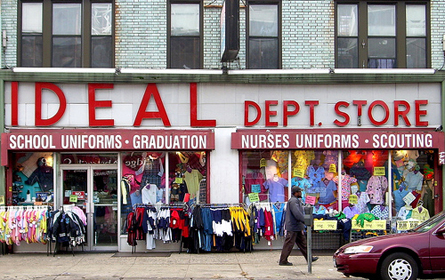In East Flatbush, the Incumbent is the Issue
Three of the five people seeking to replace Stewart did show up, however, and they made Stewart a star of the evening. While the candidates differed on hw they would solve the problems confronting this heavily West Indian district, they all agreed that Stewart must go. Many in the audience appeared to agree.
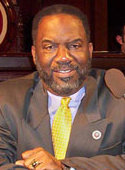
First elected in 2001, Stewart has seen two aides, including his chief of staff, plead guilty on embezzlement charges related to the City Council slush fund scandal, though he has not been charged with any wrongdoing. A building he owns in the district has been cited for multiple violations, and earlier this year he claimed to have the endorsement of several city politicians who said they had done no such thing.
Unusually for an incumbent he has little organized support, with the New York Times, Working Families Party, Caribbean Life newspaper, Citizens Union and others all endorsing one of his opponents.
Five Against One
Stewart, though, has confronted tough election fights before and won. And some people at the forum Friday expressed concern that the crowded field could dilute the opposition to Stewart, taking him to victory once again.

Facing Stewart are: Dexter McKenzie, a physician who grew up in Brownsville and now is a professor at SUNY Downstate; Sam Taitt, a professor at Kingborough Community College who hosts a radio program and is making his fourth run against Stewart; Jumaane Williams, a community organizer; Erlene King, a businesswoman and activist who worked for the district's former council member, Lloyd Henry; and Ernest Emmanuel, who has previously cited his work against police brutality and has run a very low profile campaign.
With the endorsement of the Working Families Party, an array of unions, the New York Times, Citizens Union, ACORN and others, Williams makes it clear he thinks he has the best shot to beat Stewart. He cites an editorial in Everybody's, a Caribbean American magazine, which, in endorsing him said, "The majority of voters are embarrassed over Stewart’s poor and questionable leadership and they are supporting 'any other candidate.' But voting for 'any other candidate; is exactly what Stewart wants; he hopes the other candidates will divide the vote. To avoid this disaster, voters must vote for the candidate who is most likely to defeat Stewart -- Jumaane Williams."
Williams said that candidates often get "a false idea" that they can win. But he said, "I'm a realist. The one thing I would hate is if the incumbent slips back in."
Taitt and McKenzie, though, said they deserved to be on the ballot.
Conceding he did not have much union backing, Taitt said, "These unions do not represent our district. ... These external forces should not be making the decisions for our district."
"We're still living in a democracy where people have the power to make decisions," McKenzie said. Noting that only about 8,000 people vote for council in an area with 65,000 registered voters, he continued, "We should be asking the public why aren't they voting, not why should we limit the choices."
King said she has been hard-pressed to get her message out because of ballot challenges from Williams that had her temporarily off the ballot. Although back on, she said, "I haven't been able to campaign because I've been going back and forth to court." She thinks her record and her status as the only woman in the race would have given her a good shot at victory.
Stewart's Stand
For his part, Stewart cites his record, which he says entitles him to another term on the City Council. A podiatrist from St. Vincents, he portrays himself as "Brooklyn's Renaissance man" and in this largely immigrant district points to his chairmanship of the council's Immigration Committee. In particular, his campaign literature credits him with the building of a mall at The Junction at Flatbush and Nostrand Avenues, of helping to reform the Flatbush Business Improvement District and improving schools and services to seniors.

In statements, he has rebuffed many of the charges against him.
After being challenged on claiming endorsements he did not have, for example, he said, "In the final analysis, this election is not about who endorsed or who did not endorse me. ... These petty distractions are simply attempts to subvert the will of the people and install by coercion, character assassination and political innuendo someone who does not know the district or its people."
A leaflet handed out at the forum Friday still listed the questionable endorsements, including that of Councilmember Rosie Mendez, who after hearing that Stewart had erroneously claimed her backing, threw her support to Williams, and of seven other politicians who also told the Daily News they had not endorsed Stewart.
While some in the district question how he could not have known that his chief of staff was taking money -- "you think you would demand an accounting," Greene, for one, said -- Stewart has dismissed these concerns.
Responding to Williams' calls for him to step down, Stewart said, "He may not understand that, in government, you serve the people. Just because I have been associated with people that may have done something, I’m not responsible for the [community organization which received the money], which are not part of my office.
In addition, Stewart has survived tough battles before. In 2005, Taitt picked up a number of endorsements but lost to Stewart. In 2003, the condition of Stewarts buildings emerged as an issue and Stewart blamed the problem on his tenants, telling a reporter, "It's a cultural thing. The Haitian folks, because of their poverty, will have five to eight people living in an apartment, and they will break the locks if one doesn't have a key." Despite the furor over the remarks and lead paint violations in the apartments, Stewart won re-election.
The Contenders
Williams stresses his background as an organizer, citing the work he has done on housing and other issues and saying, as a council member, he would use those organizing skills to approach many of the district's problems. He said he has worked throughout the district and written grants that brought millions of dollars onto the community.
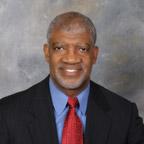
Taitt, touting his involvement in the community, has pushed hard for a credit union in the area which, he said, "will bring hundreds of thousands" of dollars to the community and boost business in the district. He has tried to minimize Williams' experience, "The election is not about community organizing," he said. "The election is about the serious problems we face today."
Taitt also said that Williams is a newcomer to the district, having moved there to run for the council seat. Williams repeatedly denied this, saying he has lived and worked in the district for more than 15 years.
McKenzie cites his own experiences, growing up poor and eventually becoming a doctor, as an example of how people can pull themselves up. "We are setting ourselves up not as an exception but as an example of what this community can produce." he said.
To address the community's problems, he said, "We're going to have to buckle down and examine the problem at their root," he said, adding a favorite phrase: "no quick fixes."
The Employment Gap
Unemployment is so high in the area, according to McKenzie, because "a large and burgeoning number of students are unemployable." He called for building job training centers as well as shopping malls. "Not just consumption, production," he said.

Williams agreed there would be no quick fixes to the unemployment problem in the district. But, he continued, "The next wave of jobs is going to be environmental. ... We have to train young people for environmental jobs."
Taitt advocates a partnership between small businesses and schools. "We do not have a business culture in our community," he said, pointing at a need to prepare young people to own businesses.
Not all small businesses are equally desirable, though. Responding to an audience question, the candidates split over the desirability of nightclubs and bars in the district. While saying zoning rules should be enforced, McKenzie thought the cubs reflected "a rich culture that could be marketed."
Taitt, though, lashed out at "owners of these clubs who do not live in the district and sit in their homes at bight and sleep when residents of this district cannot."
While urging stricter laws, Williams said that pressure had to be out on the police to enforce the ones that do exist. He urged residents to call the police and get their neighbors to call the precinct -- not 311 -- as well.
Last Minute Charges?
In fundraising, Williams hold a very slight edge in private contributions with $65,930 to Stewart's $65,770. They are followed by McKenzie with $54,7440, Taitt with $42,639 and King with $19,962. Emmanuel is not participating in the campaign finance system.
With the campaign in its final hours, some involved tend to be wary. Taitt said that in the closing days of the 2005 primary campaign, leaflets went out around the neighborhood saying, "Don't vote for Sam Taitt. He's gay." At the forum, Taitt said he is not gay but added, "If anyone wants to come out with other lies about me between now and Election Day, they can do so."
As the candidates from the 45th district clashed, several candidates from the 42nd district in East New York, also at the forum, looked on. Candidates from that district debate and then "give each other pointers on how we can do better," said Prince Lewis, one of five candidates challenging the incumbent Charles Barron. "In our district most of us kind of get along."
Real Estate's Last Stand

Under the glare of television cameras at the final mayoral primary debate last week, Councilmember and mayoral candidate Tony Avella took aim at his favorite villain.
"My opponent," he said referring to Comptroller William Thompson, "has taken huge amounts of money from the real estate industry." He paused, raised his voice and declared, "Nothing is going to change."
But in Avella's view, that villain is not so much Thompson, his primary opponent, but instead the city's real estate industry and run amuck development.
Wielding the city's most lucrative resource -- land -- developers have long used their purse strings to try to influence City Hall. And this year is no different.
The most viable citywide candidates have collected more than $2.5 million from real estate interests for the 2009 election, according to an analysis by Gotham Gazette. None have collected more than comptroller candidate and Land Use Committee Chair Melinda Katz, who took in more than 30 percent of that figure. Thompson and public advocate candidate and Councilmember Eric Gioia have also pulled in considerable sums at $393,000 and $314,807, respectively.
At the same time, some of the city's most well known or active developers have increased their donations by more than 30 percent since 2001 -- and we haven't even passed the primary.
In a city where addresses are a measure of wealth and real estate is more valuable than gold, it should come as no surprise that developers hold considerable sway over City Hall. But this primary season, should voters care whether their prospective representative is taking real estate cash or swearing off the industry altogether?
Candidates Get Cash
|
|||||||||||||||||||||||||||||||||||||||||||||
| Norman Siegel |
Public Advocate
|
$8,405
|
2.8
|
||||||||||||||||||||||||||||||||||||||||||
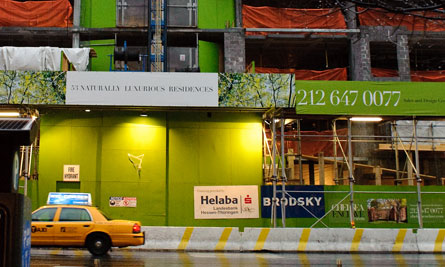 |
|||||||||||||||||||||||||||||||||||||||||||||
On stage at New York Law School earlier this summer, public advocate candidate and civil rights attorney Norman Siegel gave the audience a warning for this year's election.
"Developers are out of control," he cautioned, wearing his trademark tan suit. "You should ask every candidate here whether they get money from developers. They should disclose what developers they get money from, where they stand on these issues of eminent domain. I, for one, don't get any money from developers."
But no one, not even Siegel or Avella, is immune from the development industry.
According to our analysis, all of the citywide candidates have taken in some money from real estate interests. Katz took in more than $790,000 -- equal to about 31 percent of the private money she has raised. Katz defends her contributions, saying as head of the land use committee she did more to protect neighborhoods than court developers.
"I have raised from the same folks as all four of the candidates up here," said Katz during the final comptroller debate on Thursday. "I've raised money from an industry that I've stood toe to toe against."
Many of the companies that Katz received funding from, like Extell Development, which is responsible for the construction of Riverside South, or Rudin Management, which is developing a luxury condominium tower at St. Vincent's Catholic Medical Center, have given funds to multiple candidates in multiple races.
Rudin, for instance, has divided $55,625 between comptroller candidates Katz, David Weprin and David Yassky.
Related Companies, one of the city's largest developers that will put a proposal to develop the Kingsbridge Armory in the Bronx before the council before year's end, has given $32,425 to the citywide candidates -- $21,850 of it went to Katz's comptroller campaign.
Two Trees Management, the developer behind a controversial condominium project in Dumbo that opponents charge will obscure the view of the Brooklyn Bridge, gave more than $42,000 to members of the City Council this election cycle. Its project, Dock Street, was approved in June (Two Trees gave $10,000 to Gioia, who voted against the plan).
Doug Muzzio, a professor at Baruch College, said developers take this tactic to cover all of their bases. "The name of the game is land in New York and it's valuable," Muzzio said. "They are heavy contributors across a broad range of candidates, because they want to protect themselves."
Of the citywide candidates, both Avella and Siegel have been the most critical of developers. Nearly all of Siegel's contributions associated with the industry -- which total $8,405 -- come from low-level realtors. He has one $4,950 contribution from a West Harlem developer that fought against the expansion of Columbia University -- a position Siegel also took.
Avella has taken some funding from larger developers, like Muss Development, one of the largest single contributors in the 2005 election, according to the Campaign Finance Board. The Avella campaign said these developer contributions are from individuals Avella knows and are the "good guys."
A Quid Pro Quo?
In addition to these citywide contests, incumbent City Council members running for re-election are also raking in real estate funding -- many from developers who are managing, proposing or building projects in their districts.
In Jamaica, the site of one of the city's largest rezonings, Councilmember Leroy Comrie, who represents part of the area, took in more than $17,000 from real estate interests.
Councilmember Maria del Carmen Arroyo has taken in $6,225 from Jackson Development, which is planning a four building, 535-unit residential development for low and middle-income residents in her district. Jackson also gave $3,725 to Councilmember Maria Baez. The company is planning an 85-unit, mixed income building in her district on Monroe Avenue, which does not need city approval.
Eli Weiss, the director of finance for Jackson Development, said these projects are affordable housing, which the community wants. It is in no way a quid pro quo, he said.
"This is what is wanted by the local community and the local politicians," said Weiss. "This is housing that is going to remain affordable for years."
And it's not just incumbents who are seizing this type of funding. In Riverdale, incumbent Oliver Koppell is lashing out at his challenger, Anthony Cassino, for taking more than $4,000 from Riverdale developer John Fitzgerald -- who is behind a controversial luxury housing development in the district.
In Fort Greene, Councilmember Letitia James is facing off against Delia Hunley-Adossa, who is an ally of Atlantic Yards developer, Forest City Ratner. Even though Hunley-Adossa has not received funds from Ratner directly, her ties to the project have caused controversy.
Like it or not, candidates and observers say, taking developer money during the campaign season may make it look like a councilmember is favoring the developer at the Land Use Committee
"If you look at the amount of money [the industry] spends, you find they are one of the biggest contributor blocks as a profession," said Josh Skaller, who is running for City Council in the 39th district in Brooklyn and has pledged to not take developer money. "There is a direct correlation, in my opinion, in how our neighborhoods are being overbuilt right now."
A Bloomberg Backlash
Skaller's comments reflect the newest trend hitting the campaign trail: being anti-developer.
In what some say is a backlash from the Bloomberg administration's pro-development agenda, some City Council candidates -- especially in areas where development has flourished -- have pledged to keep the real estate industry out of their campaign coffers.
"We want smart in-scale development that creates affordable housing and good jobs," said Brad Lander, a leading candidate for the 39th district, which stretches from Cobble Hill to Park Slope in Brooklyn. Since January, Lander has pledged to not take any funding from for-profit developers. "I think it's important that when elected officials make their decisions, they are being influenced by the public and the community and not campaign contributors."
The 39th district, candidates say, has seen some of the city's most out of scale development, like 10 to 15 story condominium buildings on Fourth Avenue. Next door, in district 33, which is the site of the massive Williamsburg Greenpoint rezoning, candidates are also taking an anti-developer funding oath, including one of the leading contenders Jo Anne Simon.
"A big issue throughout the city is development and the influence that developers have on decisions that are made with regard to rezoning projects," said Simon. "It's just better in my mind if you are not taking money from people that have an appearance of a conflict."
Simon has taken contributions from local realtors and landlords, which she says is not a conflict of interest.
And further north in Long Island City -- also a target for large luxury development -- candidates are saying no to developer cash as well.
|
||||||||||||||||||||||||||||||||||||||||
| TACONIC INVESTMENT PARTNERS |
$58,218.00
|
$16,700.00
|
10,250.00
|
|||||||||||||||||||||||||||||||||||||
| VORNADO REALTY TRUST |
$49,735.00
|
$8,000.00
|
$76,075.00
|
|||||||||||||||||||||||||||||||||||||
| ATLANTIC DEVELOPMENT |
$31,674.00
|
$26,000.00
|
$27,750.00
|
|||||||||||||||||||||||||||||||||||||
| THOR EQUITIES |
$25,325.00
|
$29,400.00
|
$1,000.00
|
|||||||||||||||||||||||||||||||||||||
| KAUFMAN ORGANIZATION |
$23,770.00
|
$14,700.00
|
$14,500.00
|
|||||||||||||||||||||||||||||||||||||
| CUSHMAN AND WAKEFIELD |
$22,835.00
|
$22,575.00
|
$68,740.00
|
|||||||||||||||||||||||||||||||||||||
| EXTELL DEVELOPMENT |
$17,615.00
|
$11,500.00
|
$0.00
|
|||||||||||||||||||||||||||||||||||||
| MUSS DEVELOPMENT |
$17,600.00
|
$68,433.00
|
$54,145
|
|||||||||||||||||||||||||||||||||||||
| TISHMAN SPEYER |
$13,950.00
|
$10,850.00
|
$67,725.00
|
|||||||||||||||||||||||||||||||||||||
| FOREST CITY RATNER |
$970.00
|
$500.00
|
$7,535.00
|
"It's not only that you would be influenced by taking the money, but also the appearance of impropriety," said Brent O'Leary, a candidate for the 26th district in Queens. "I think it's important for the community to know that you're fighting for the community."
In the past seven years of the Bloomberg administration, approximately 100 rezonings have been approved by the City Council. Though a vast majority of those plans were to preserve the current scale and character of the city's neighborhoods, many allow large-scale, mixed-use development. In a lot of those areas, these anti-development candidates are emerging, in what some say is an outcry from the community for a change.
"Certain neighborhoods in the city have definitely seen unfettered undemocratic planning in their neighborhoods, whether it's Yankee Stadium or folks out in Queens that are really upset about McMansion development," said Bettina Damiani, project director at Good Jobs New York, an arm of the Fiscal Policy Institute. "Projects impact our lives and with this particular mayor, we are seeing it clearly."
Tomorrow's results will be a good indication of whether these messages are sticking.
The End of an Era?
Even though millions have poured in from developers this election cycle, this could be the last time the industry will be able to peddle such influence.
In 2007, the Bloomberg administration and the City Council approved pay to play legislation that limits contributions from anyone that does business with the city, including developers with land use applications. Developers who had been able to give up to $4,950 for citywide candidates and $2,750 for council candidates must now adhere to limits of $400 and $250, respectively. These limits took effect in December 2008, and the vast majority of contributions to citywide candidates came in before this deadline.
While the law might be too late to affect this year's election, Eric Friedman of the Campaign Finance Board said, the "problem" has been fixed.
"It didn't kick in in time," he said, adding, "This really is the broadest play to pay restriction in any jurisdiction anywhere in the country… [It] covers a broad range of business relationships."
The law applies to anyone who has more than a 10 percent stake in the company, as well as high-level managers and chief executive officers. It doesn't, however, apply to the family or friends of these individuals.
Though good government groups and advocates applauded the bill, many doubt that this will be the end of the real estate industry's era in city government.
"I can express hope, but knowing at the same time money is like water, and it tends to find where it wants to go," said Gene Russianoff of the New York Public Interest Research Group. "We'll see."
Seabrook Aims For Another Term
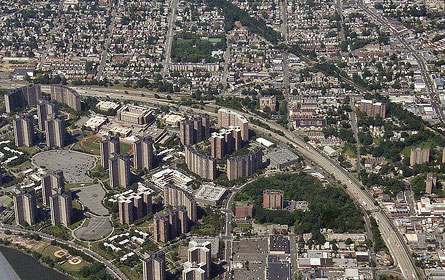
Councilmember Larry Seabrook isn’t afraid to list his accomplishments.
He says he’s upgraded district 12’s school libraries and brought computers and a new playground to P.S. 78 and an elevator to P.S. 113.
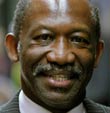
“The biggest accomplishment is providing services to the district that are so desperately needed in terms of education,” said Seabrook, sitting behind the dias at last week’s zoning meeting. “We have put computers and lap tops and smart boards in all of the schools.”
But this list hasn’t prevented two challengers from mounting campaigns against him -– spurred, they say, by questionable appropriations by the incumbent and a lack of commitment to the community. Tomorrow Seabrook, who was elected to the City Council in 2001 and served in both the State Assembly and State Senate before that, will face off against Jerome Rice, a former corrections officer turned civil rights activist, and Andy King, the founder of the Bronx Youth Empowerment Program and an organizer for SEIU.
Despite Seabrook’s long record of public service, his challengers say the district, which includes Edenwald, Co-Op City, Wakefield, Williamsbridge and Baychester, is fragmented and neglected. King, who is mounting the most aggressive challenge, says he would work to unify the community, while Rice says he wouldn’t have to do much to be an improvement over the incumbent.
“All I have to do is my job, and that’s a whole lot more than what the councilman is doing now,” said Rice –- a large man with the build of a linebacker. “He’s currently doing nothing.”
On the other hand, Seabrook says he would use a third term to continue to provide the services he gives the community right now. With another four years, Seabrook says he wouldn’t change his approach at all.
A Mixed Record
Seabrook’s second term in the City Council hasn’t been an easy ride. Following the council’s slush fund scandal, Seabrook has been the subject of intense examination by the press.
The New York Times found that an organization Seabrook incorporated and is closely tied to, the African-American Bronx Unity Day Parade, received inflated payments from the city. Seabrook has been charged with nepotism, and his attendance record -– just over 73 percent -- is one of the lowest of the council’s 51 members.

When asked about these claims, Seabrook says, “I don’t have any response to it other than the service [I’ve provided] in the community. I haven’t heard anything from my community responding to it.”
To a certain extent, Seabrook is right. The councilmember has pretty much secured every important endorsement in the race. He has gleaned the support of the Bronx Democratic Party, District Council 37, the United Federation of Teachers and former Mayor David Dinkins. His most formidable opponent, King, was not able to get the endorsement of SEIU, which he organizes for. The service employees went for Seabrook.
He has raised $38,009 in private funds and received $88,550 in matching funds –- far more than Rice’s $18,084. King has received $34,566 in private funds and $79,730 in public funding.
With another term, Seabrook says he would focus on upgrading the districts school facilities and work to get job placement programs.
“They want to make sure we have educational programs that take our children in to the 21st century … job programs,” Seabrook said of his constituents. “That’s what the people in my community are talking about. My opponents, I don’t know what they’re talking about.”
Challenging A Mainstay
For the most part, Rice, who works with the civil rights group, Blacks in Law Enforcement Alliance, talks about Seabrook. During a recent debate at Bronxnet, the county’s public access channel, Rice dug into Seabrook’s record –- which he says doesn’t amount to much. He criticized the incumbent for not taking part in the debate as well.
Seabrook said he had a scheduling conflict and was not avoiding the debate.

Beyond that, Rice said his first priority if elected to the City Council would be to close the communication gap between the community and the police.
“I want to close the communication gap between law enforcement and the community,” Rice said. “[You} get both the law enforcement and the community to work together. That’s the only way you’re going to reduce crime.”
Rice also said he would introduce legislation that would take the Civilian Complaint Review Board out from under the jurisdiction of the Police Department and put it under the borough district attorneys’ offices. Police should not be in charge of punishing their own misconduct, he said.
King, a soft-spoken former case worker for District Council 37, said his first priority would be to engage the community and keep them informed. He also said one of his top priorities would be to make the district once again affordable and conducive to working families.
“If you go down White Plains Road, I wouldn’t say it’s deplorable, but it’s conducive to crime,” King said. “We need to create an environment that shows that people are living here and that people want to be engaged.”
King is proposing to introduce what he calls the “New York City Worker Housing Act,” which would allow any city employee to live in any borough with a stabilized rent. He also wants to create an independent finance office for the City Council, which would track funding and ensure services are actually delivered.
Drawing his inspiration from President Barack Obama, King says he will bring “change” to district 12.
“The name and the choice for change is Andy King,” he says.
Whoever wins tomorrow’s primary will face off against Joseph Sauerzopf, a Conservative, and Martin Badonsky, a Republican, this fall. Because the district is heavily Democratic, the primary is a good indication of who will win in the general election. Sebastian Ulanga will appear on tomorrow’s ballot, but he has dropped out of the race.
